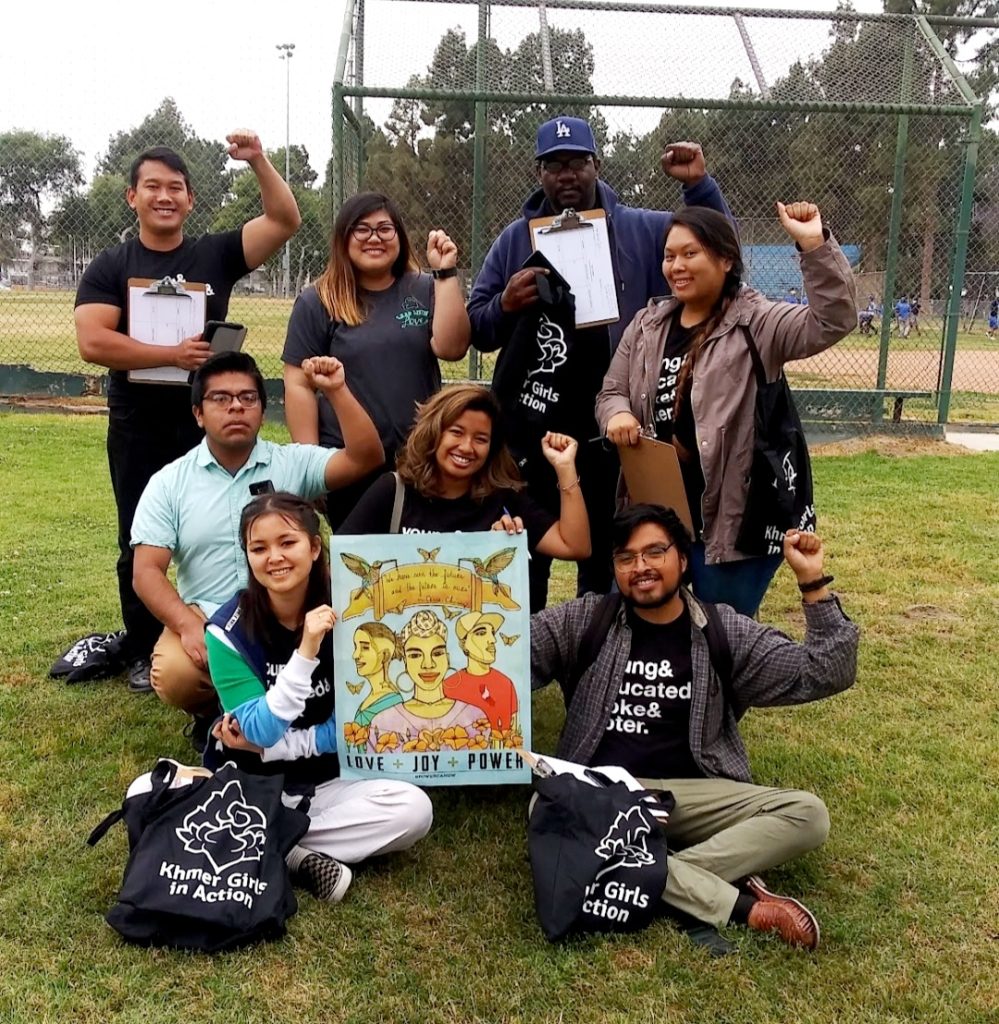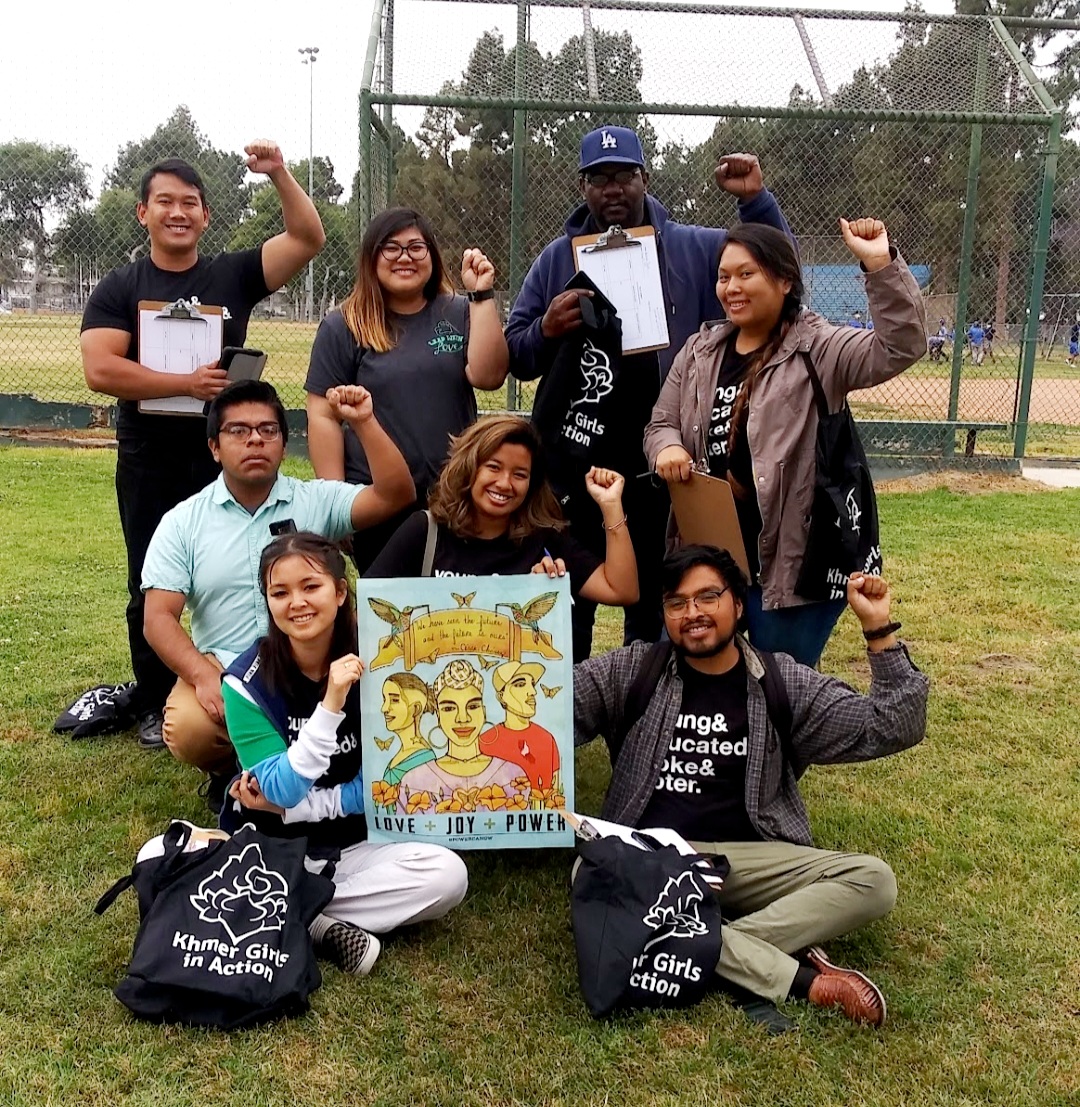Honoring Voting Rights Legacy by Casting Your Ballot in this Primary Election
7 minute readThe views expressed in this perspective piece do not necessarily reflect the views of FORTHE Media.
Jomar, who is in the process of becoming a naturalized citizen after emigrating to the U.S. as a child with his parents, described why he became involved in a voter engagement program, tasked with informing and turning out voters.
“Ever since I started to recognize the importance of local, statewide, and national politics, I have seriously wanted to get involved in the electoral process even if it was on a small level,” Jomar, a student at Poly High School, said.
He continued, “With the most recent leak from the Supreme Court (ie. Roe v. Wade), my sentiment in this regard has only strengthened with the defense of rights I personally hold dear, [including] reproductive rights and LGBTQ rights.”
Jomar joined Khmer Girls in Action’s Integrated Voters Engagement Program May of 2022, which has been phonebanking Long Beach voters about the importance of voting and to make sure voters have a space to also process the current climate of our political landscape.

The Long Beach primary election season began in early May when voters received their mail-in ballot and lasts until June 7th. With only a few days left until the primary election concludes, there’s a lot at stake on this year’s ballot for Long Beach voters to consider. Namely, choosing who will be the next candidate for the California Governor, the next Long Beach Mayor position to elect in the November General Election, as well as several other seats open for elected office. However, Long Beach Mayoral candidates can win outright by securing more than 50% of the vote June 7th, avoiding a runoff in the fall.
Knowing what’s at stake on the ballot, by fully vetting incumbents and challengers, is a crucial part of civic engagement.
Voting for policies and candidates who best represent our values and our community’s priorities, and working on-the-ground with community organizers outside of election cycles, is imperative towards creating solutions that will benefit us all collectively.
An organized and politically informed community is our safest bet at enacting social and economic change with the ballot box, as evidenced by local ballot measures that passed in recent years. Specifically, we have seen ballot measures that have benefited youth and hotel workers, primarily women of color. These progressive ballot measures would not have been possible without the efforts of community organizing, plus the critical support from a number of elected officials working hand-in-hand, along with Long Beach voters.
Ballot measures passed overwhelmingly by Long Beach voters, including US (2020), WW (2018), and N (2012) didn’t occur in a political vacuum. Some elected officials took part in co-leading these issues by being advocates in the halls of power, giving voice to our grassroots community.
Organizations like Long Beach Forward, Long Beach Coalition for Good Jobs and Khmer Girls in Action, among others, laid the groundwork through campaigns such as #StandWithWomenLB and Invest in Youth Campaign, respectively.
Elected leaders willing to support progressive issues, alongside working class people, are the types worthy of electoral support. The ballot measures, in addition to receiving support from elected officials, were centered around those directly impacted.
Numerous City Council testimonies, constant door-knocking, phone-banking, and protests in support of all of these progressive measures were led by working-class people.
By recognizing that the electoral arena and year-round community organizing outside of election season are symbiotic, ordinary people have been able to collectively enact change. We owe this approach to movements and organizers who preceded us.
Tomisin Oluwole
Face the Music, 2022
Acrylic on canvas
24 x 36 inches
Click here to check out our interview with Tomisin Oluwole, a literary and visual artist based in Long Beach.

Instead of gunking up our site with ads, we use this space to display and promote the work of local artists.
With a resurgence of attacks across the U.S. against voting rights and in favor of a voter suppression that particularly target communities of color, taking the time to study historic individual voting rights advocates, along with the larger movements that they were a part of, can inform and inspire our current fight for racial, gender, and economic justice.
My own recent studies about the topic brought me across two names, who are examples of the kind of organizers needed to confront our current challenges.
Fannie Lou Hamer, a grassroots-based organizer and sharecropper, rooted in the 1960s struggles for Black voting rights in Mississippi; and Dr. Mabel Ping-Hua Lee, a Chinese-American women’s rights activist and pro-women’s suffrage advocate, stood out as strong symbols of our power to make change.
Hamer, who helped lead organizing efforts during 1964’s Freedom Summer, which brought Black and white college youth from all over the U.S. to participate in voter registration efforts amongst the Black community in Mississippi, is an often omitted name in the history books.
Nonetheless, her efforts and advocacy helped create the groundswell which eventually led to the passage of the 1965 Voting Rights Act, a federal law barring racial discrimination in voting.
Hua Lee, who emigrated as a child with her family from China to America, was not recognized as an American citizen due to restrictions under the nativist-inspired 1882 Chinese Exclusion Act, designed to prohibit Chinese laborers from the U.S.
Nonetheless, Hua Lee’s contributions towards women’s rights during the 20th century’s Women’s Suffrage Movement, helped set the stage for the 19th Amendment passed in 1920, guaranteeing all American women the right to vote. Sadly, due to Hua Lee not being recognized as a citizen until several years later, she wasn’t able to take part in the spoils that her efforts helped garner.
These brief snapshots of both heroines are by no means an exhaustive history of women’s contributions to wider movements they are a part of. Instead, uplifting the stories of ordinary people who enact change at the grassroots level, therefore paving the way for legislative change, is the takeaway here.
Furthermore, both heroines’ roles in struggle are undoubtedly connected to current reforms that have been advanced in relation to electoral politics and legislation such as the California Voter’s Choice Act (VCA) approved by lawmakers in 2016, which allows more flexibility in exercising our right to vote.
Proposition 17, passed by California voters in 2020, helped restore the rights of those who are system impacted to vote, which includes an estimated 50,000 people.
These reforms, according to some organizations, are part of a national trend to restore voting rights to the disenfranchised.
Immigrant communities and young people today continue to organize around voting rights and are the reason why many of us are activated and unafraid to vote, volunteer and educate our communities, despite being marginalized from the voting process.
Let’s continue to vote in honor of those who have helped pave the way for voting rights in U.S history by turning out in this primary election.
Michael Brown is the Civic Engagement Team Lead for Khmer Girls in Action, a community-based organization whose mission is to build a progressive and sustainable Long Beach community that works for gender, racial and economic justice led by Southeast Asian young women.


 FuriusMic@gmail.com
FuriusMic@gmail.com




